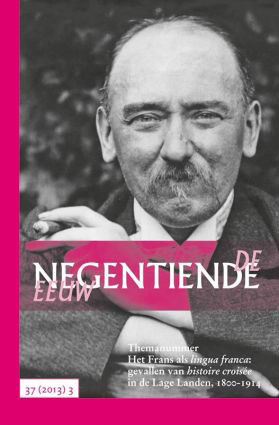Elke Brems, Mathijs Sanders en Liselotte VandenbusscheHet Frans als lingua franca in de Lage Landen (1800-1914) 177-183
Guy RooryckDe verloren zege van een lingua franca. Het Frans aan de vooravond van de negentiende eeuw 184-200
Abstract (EN)
A lingua franca’s lost victory. The French language at the dawn of the nineteenth century.The privileged position of French in the nineteenth century is the result of a long process. An early administrative centralization, the tight norms and standardization of the language, which gradually assumes the position formerly held by Latin, the use of French in diplomacy, at European courts, but also the oppression and expulsion of Protestants after the revocation of the Edict of Nantes (1685) and the impact of the French Revolution are all elements that were partly responsible for the acceptance of French as the European lingua franca. By discussing the particular case of two well-known works of the Enlightenment, this contribution will explore how French could only achieve its status of transnational language of culture thanks to the dynamic interaction between cultures. The publication history of Locke’s Essay concerning human understanding and La Mettrie’s L’homme machine reveals how the Netherlands played a pivotal role in the cultural and historical exchange between England and France. Both works emerge from the dynamics yielded by a collective European cultural model, which went through a profound metamorphosis on the eve of the nineteenth century. In that respect, the lingua franca status of French is undoubtedly a case of “histoire croisée”: it reflected and expressed a context of ideas that was itself created by the intersection of European tongues and cultures. Shaping and communicating secularized patterns of thought and universalist values thanks to this dense European network, French retained its position of cultural idiom until the first decades of the twentieth century. Then new norms and values steadily gain the upper hand, echoing other models of civilization.
Pieter BoulogneDe Rus uit Parijs. Dostojevski en de grenzen van de Nederlandse en Vlaamse literatu(u)r(en) 201-216
Abstract (EN)
The Russian from Paris. Dostoevsky and the borders of the Dutch and Flemish literary systems.Central to this article lies the question what a recent study on the Dutch reception of Dostoevsky in the period from 1881 until the outbreak of the Great War can tell us about the borders of the Dutch and Flemish literary polysystem(s). An overview is provided of the observed intersystemic transfers, in the critical texts dealing with Dostoevsky, as well as in his early Dutch translations. It turns out that the writer’s early Dutch reception bears a heavy French stamp both in its critical and in its translational aspect. Nevertheless, it is argued that the observed dependency should not be attributed to the Dutch literature as a whole.
Fieke de Hartog en Rob van de SchoorGemengd dubbel met Pascal, Huet, Souvestre en Van Lennep. Een wijsgeer onder de hanebalken (1858) van Émile Souvestre in (het) Nederland(s) 217-230
Abstract (EN)
Exchanging liberal and petty bourgeois views in French and Dutch nineteenth-century literature.A reference to a novel by Émile Souvestre, Un philosophe sous les toits (1851), by Dutch critic Conrad Busken Huet is the starting point of a quest for Dutch translations and adaptations of episodes from Souvestre’s novel. By means of pragmatic induction, the method advocated by the histoire croisée, this investigation opens up perspectives on the interaction between France and the liberal avant-garde in the Netherlands, more specifically on the topical significance of Blaise Pascal. Huet, minister of the Dutch église wallonne, propagated the use of Pascal’s method, as demonstrated in his Lettres provinciales, to influence public opinion. He did so in theory, in his periodical La seule chose nécessaire, and put it into practice, in his ‘Brieven van een kleinstedeling’ (‘Lettres by a small town citizen’) in the Dutch weekly Nederlandsche Spectator. There he fought the opinions of orthodox calvinists, who had opposed to Huet’s adaptation of one of the episodes from Souvestre’s novel.
Piet Couttenier‘Il parle tout simplement le français’. Een merkwaardig pleidooi van Guido Gezelle voor het Frans 232-240
Abstract (EN)
‘Il parle tout simplement le français’. Guido Gezelle’s remarkable plea in favour of the French language.The case study deals with an article of 1885 by the well-known Flemish poet and philologist Guido Gezelle in Le Muséon, a scientific review for oriental studies of the University of Louvain edited by Charles de Harlez. The article by Gezelle functions as an introduction to the activities of a group of Flemish philologists around the journal Loquela which was published from 1880 on. Gezelle however takes a particular position as he argues that the linguistic situation of the Flemish is rather favourable: in informal contacts he can rely on his dialect idiom. For formal social situations and higher cultural or intellectual communication Gezelle rejects the Dutch standard language and prefers the French language. This much debated standpoint reveals surprisingly the real high status of French as lingua franca in the intellectual and scientific world in Belgium and Flanders during the long 19th century.
Liselotte VandenbusscheHet Frans als doorgeefluik van een Vlaams verleden. Hendrik Conscience in handen van Georges Eekhoud 241-256
Abstract (EN)
French acculturations of a Flemish past. Georges Eekhoud adapts Hendrik Conscience.In this article, two adaptations by Georges Eekhoud (1854-1927), a francophone author living in Flanders, are compared to the original stories by the Dutchspeaking Flemish novelist Hendrik Conscience (1812-1883). Following the method of histoire croisée, this article studies the acculturation of Conscience’s stories by Eekhoud and the image he thus creates of the author and his work. Eekhoud either stresses the importance of diverging from the source literature to reveal its essence or masks his intervention completely, while he simultaneously stimulates close translations of his own publications by Dutch-speaking Flemish authors. By integrating two ‘back-translations’ in Dutch of Eekhoud’s French Conscience translations, this study reveals an entangled network of influences and ideologies.

